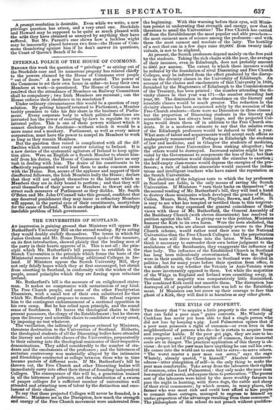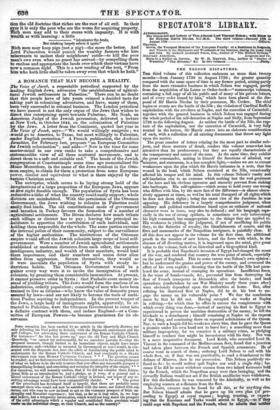THE EVILS OF PROPERTY.
THE theory that "to acquire a little property is the worst thing that can befal a poor man" gains converts. Mr. Whately of Cookham has never yet been able to find a single person who did not lose by keeping a pig. Lord Palmerston opines that if a poor man possesses a right of common—or even lives in the neighbourhood of persons who do—he is certain to acquire loose and irregular habits. If the poor get pigs, they are sure to be- come paupers ; and if they get rights of common, their immortal souls are in danger. The practical application of this theory is ob- vious : do not let the poor man have anything he can call his own. He comes into the world not to earn but to serve—to serve others. " The worst master a poor man can serve," says the sage Whately, already quoted, " is himself." Absolute disinterest- edness—utter abnegation of self—is the only thing to make the poor man comfortable. Take away from the -labourers their rights of common, cries Lord Palmerston : they only make the poor man less regular and moral, and expose them to persecution. "The poorer sort of the labourers were hired by the more wealthy farmers to pass the night in hunting, with fierce dogs, the cattle and sheep of their rival commoners; by which means' in many places, the farmer who was most rich and could best afford to hire people to commit these outrages, managed to engross to himself an undue proportion of the advantage resulting from these commons." The philosophers of this school do not preach without qualifica- tion the old doctrine that riches are the root of all evil. In their eyes it is only the poor who are the worse for acqnumg property.. Rich men may add to their stores with impunity. It is with wealth as with learning: a little "intoxicates the brain, But drinking largely sobers it again."
Rich men may keep pigs (not a pig)—the more the better. And Iord Palmerston would punish the wealthy farmers who hire miscreants to molest their neighbours' cattle—to kill the poor man's ewe even when no guest has arrived—by compelling them to enclose and appropriate the lands over which their victims have ttow a common right. This is a new reading of the text, "From him who hath little shall be taken away even that which he hath."



























 Previous page
Previous page